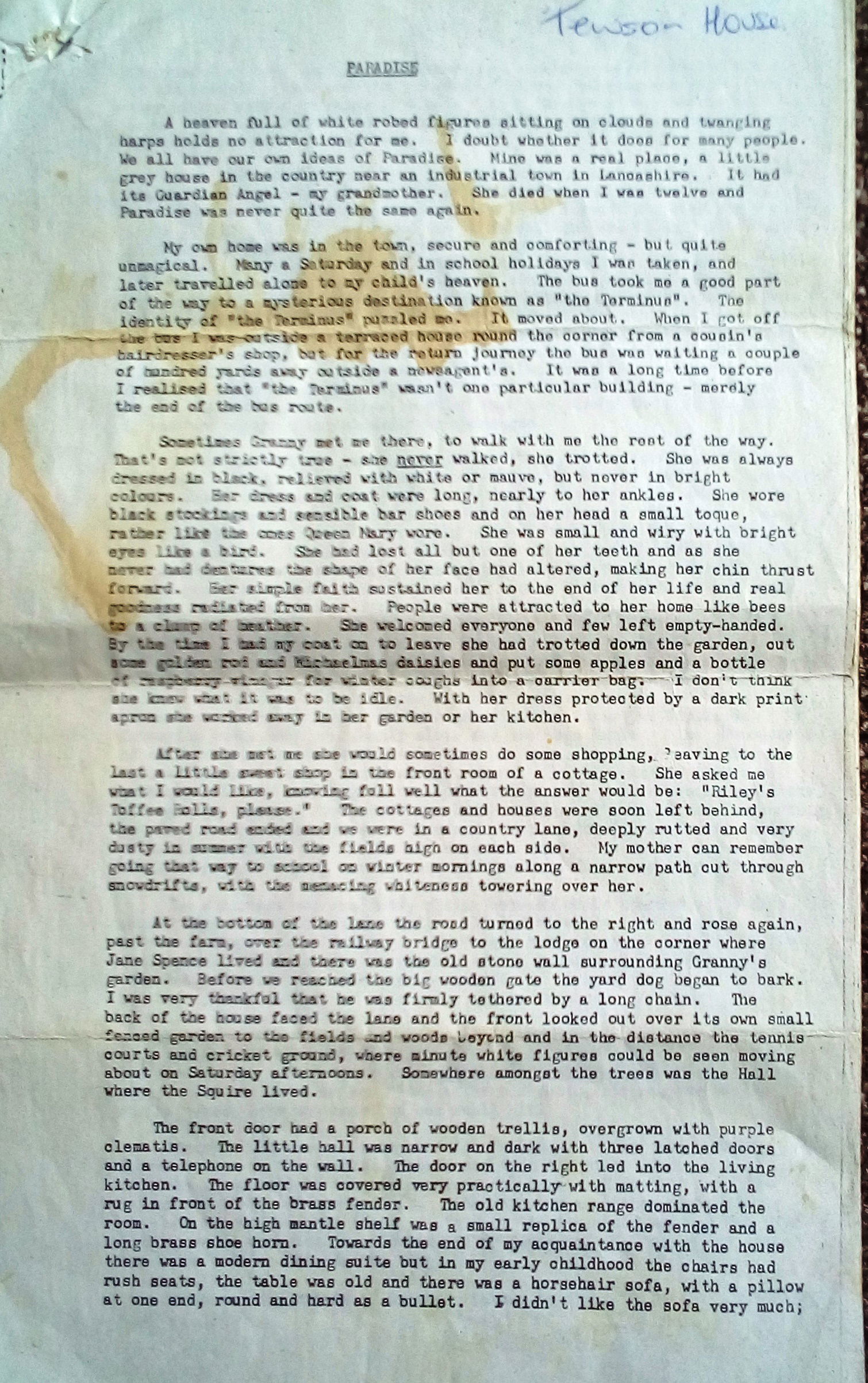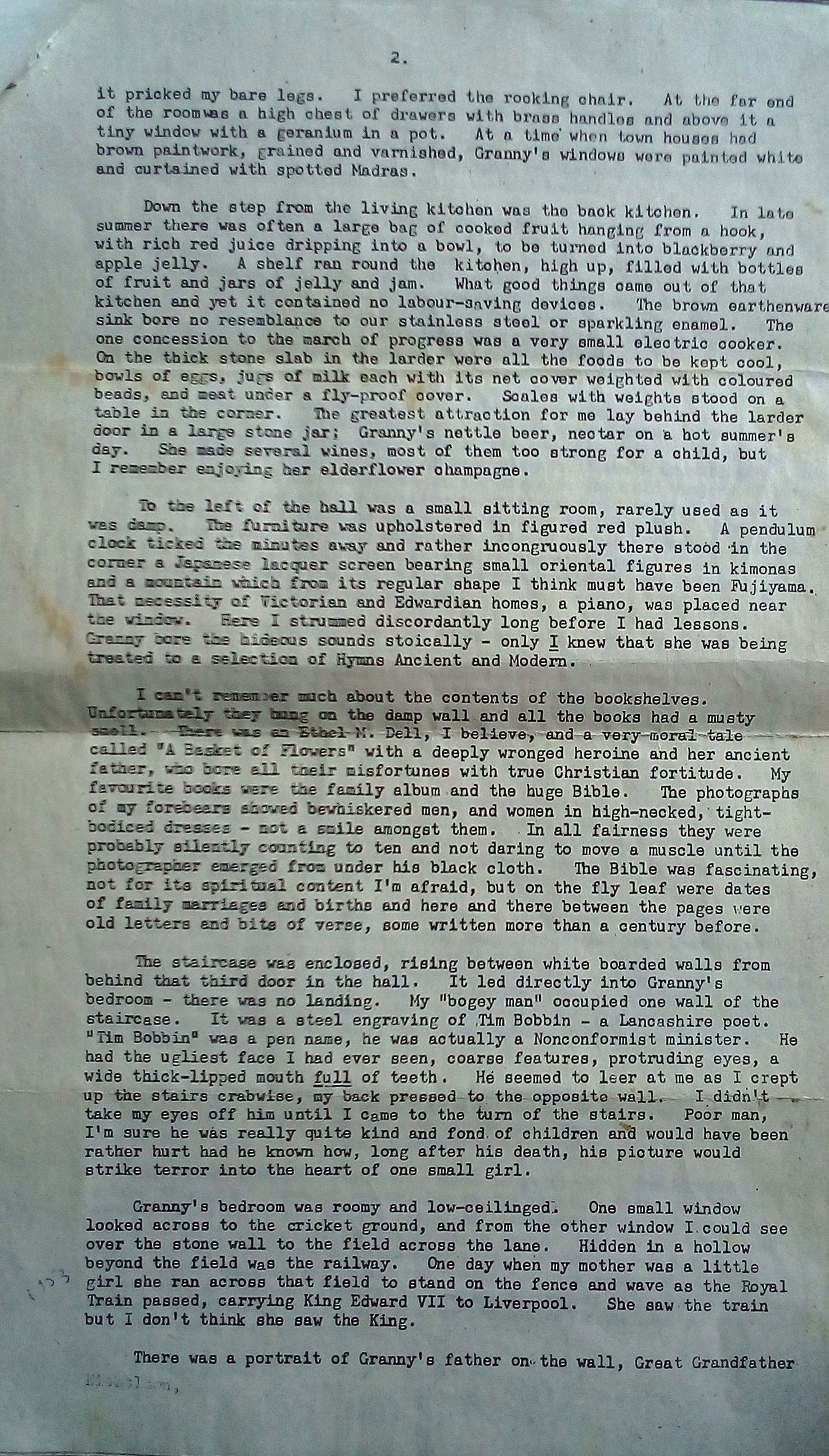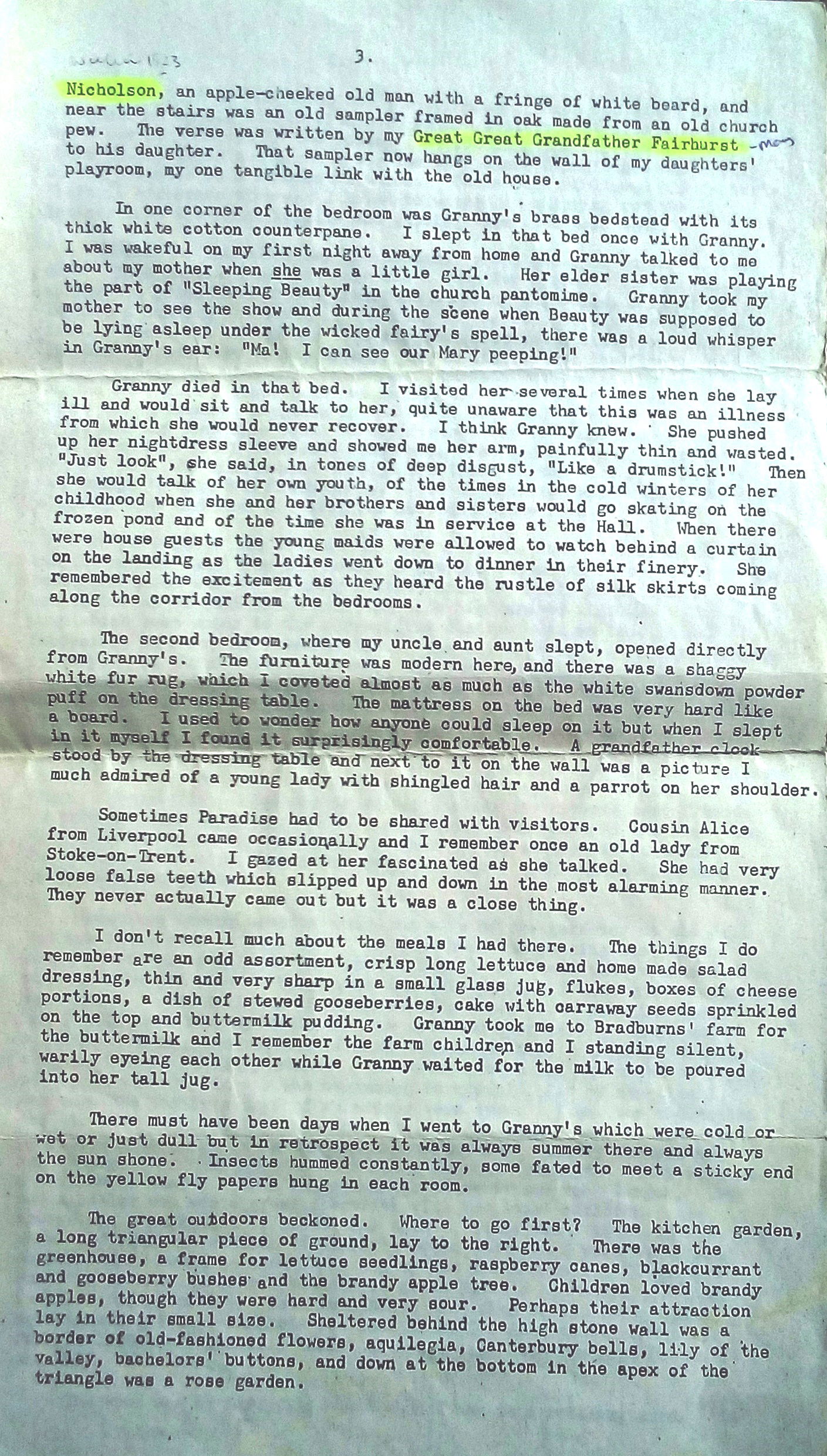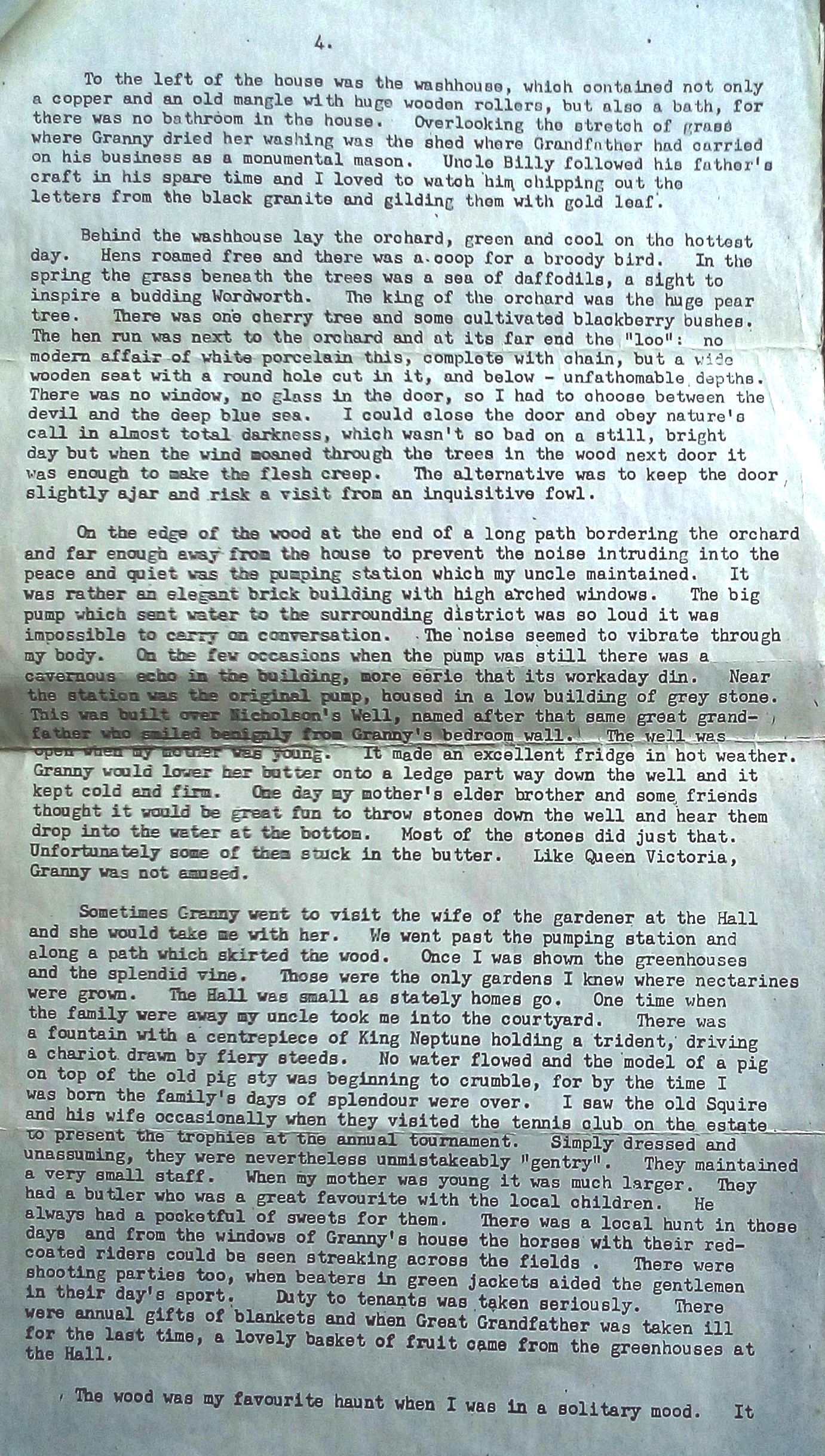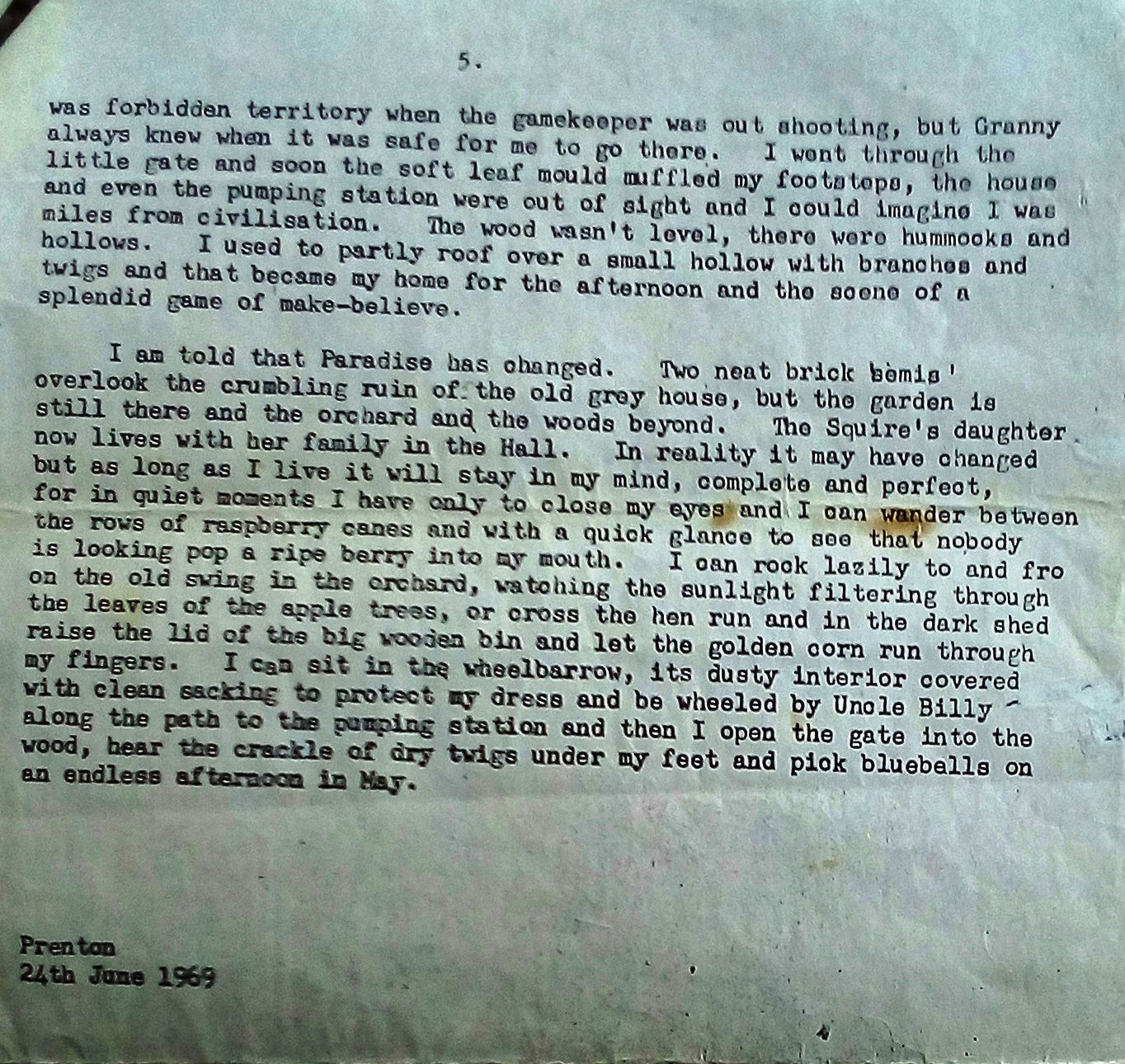Recollections of visits to Tucson House, Winstanley
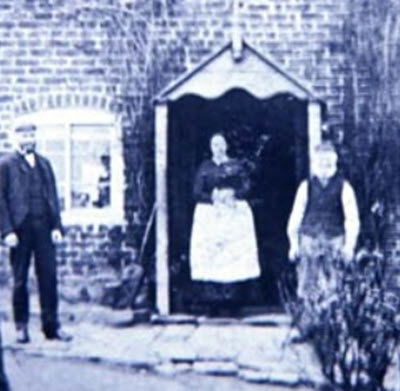
Childhood memories and recollections of Jean Farrimond visiting her grandparents at Tucson House in the 1930's. a marvellous example of social history.
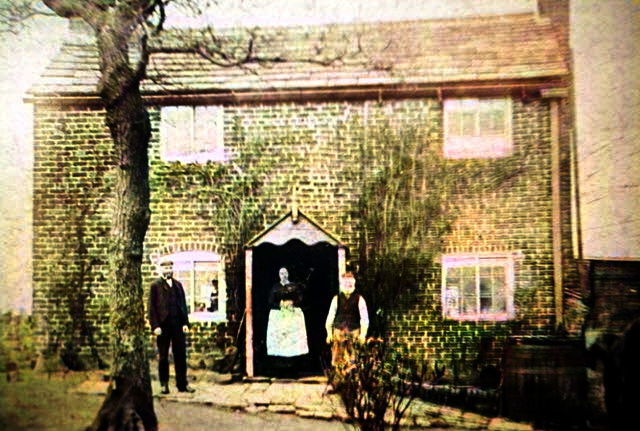
A heaven full of white robed figures sitting on clouds and twanging harps held no attraction for me. I doubt whether it does for many people, we shall all have our paradise. Mine was a real place, a little grey house in the country near an industrial town in Lancashire. It had its Guardian Angel – my grandmother. She died when I was twelve and Paradise was never quite the same again.
My own home was in the town, secure and comforting – but quite unmagical. Many a Saturday and in school holidays I was taken, and later travelled alone to my child’s heaven. The bus took me a good part of the way to a mysterious destination known as “The Terminus”. The identity of “the Terminus puzzled me. It moved about. When I got off the bus I was outside a terraced house round the corner from a cousin’s hairdresser’s shop, but for the return journey the bus was waiting a couple of hundred yards away outside a newsagent’s. It was a long time before I realised that “the Terminus” wasn’t one particular building – merely the end of the route.
Sometimes Granny met me there, to walk with me the rest of the way. That’s not strictly true – she never walked, she trotted. She was always dressed in black, relieved with white or mauve, but never in bright colours. Her dress and coat were long, nearly to her ankles. She wore black stockings and sensible bar shoes and on her head a small toque, rather like the ones Queen Mary wore. She was small and wiry with bright eyes like a bird. She had lost all but one of her teeth and as she never wore dentures the shape of her face had altered, making her chin thrust forward. Her simple faith sustained her to the end of her life and real goodness radiated from her, People were attracted to her home like bees to a clump of heather. She welcomed everyone and few left empty-handed. By the time I had my coat on to leave she had trotted down the garden, cut some golden rod and Michaelmas daisies and put some apples and a bottle of raspberry vinegar for a winter cough into a carrier bag. I don’t think she knew what it was to be idle. With her dress protected by a dark print apron she worked away in her garden or her kitchen.
After she met me she would sometimes do some shopping, leaving to the last a little sweet shop in the front room of a cottage. She asked me what I would like, knowing full well what the answer would be: “Riley’s Toffee Rolls, please”. The cottage and houses were soon left behind, the paved road ended and we were in a country lane, deeply rutted and very dusty in summer with fields high on each side. My mother can remember going that way to school on winter mornings along a narrow path cut through snowdrifts, with the menacing whiteness towering over her.
At the bottom of the lane the road turned to the right and rose again,past the farm, over the railway bridge to the lodges on the corner where Jane Spence Lived and there was the old stone wall surrounding Granny’s garden. Before we reached the big wooden gate the yard dog would bark. I was very thankful that he was firmly tethered by a long chain. The back of the house faced the lane and the from looked out over its own small fenced garden to the fields and woods beyond and in the distance the tennis courts and cricket ground, were minute figures could be seen moving about on Saturday afternoons. Somewhere amongst the trees was the Hall where the Squire lived.
The front door had a porch of wooden trellis, overgrown with purple clematis. The little hall was narrow and dark with three latched doors and a telephone on the wall. The door on the right led into the living kitchen. The floor was covered very practically with matting, with a rug in front and a brass fender. The old kitchen range dominated the room. On the high mantle was a small replica of the fender and a long brass shoe horn. Towards the end of my acquaintance with the house there was a modern dining suite but in my early childhood the chairs had rush seats, the table was old and there was a horsehair sofa, with a pillow at one end, round and hard as a bullet, I didn’t like the sofa very much, it pricked my legs. I preferred the rocking chair. At the far end of the room was a high chest of drawers with brass handles and above it a tiny window with a geraniun in a pot. At at ime when town houses had brown paintwork, grained and varnished. Granny’s windows were painted white and curtained with spotted Madras.
Down the step from the living kitchen was the back kitchen. In late summer there was often a large bag of cooked fruit hanging from a hook, with rich red juice dripping into a bowl, to be turned into blackberry and apple jelly. A shelf ran round the kitchen, high up, filled with bottles of fruit and jars of jelly and jam. What good things come out of that kitchen and yet contained no labour-saving devices. The brown earthenware sink bore no resemblance to our stainless or sparling enamel. The one concession to the march of progress was very small electric cooker. On the thick stone slab in the larder were all the foods to be kept cool, bowls of eggs, jugs of milk each with its net cover weighted with coloured beads, and meat under a fly-proof cover. Scales with weights stood on a table in the corner. The greatest attraction for me lay behind the larder door in a large stone jar; Granny’s nettle beer, nectar on a hot summer’s day. She made several wines, most of them too strong for a child, but I remember enjoying her elderflower champagne.
To the left of the hall was sitting room, rarely used as it was damp. The furniture was upholstered in figured red plush. A pendulum clock ticked the minutes away and rather incongruously there stood in the corner a Japanese lacquer screen bearing small oriental kimonas and a mountain which from its regular shape I think must have been Fujiyama.
That necessity of Victorian and Edwardian homes, a piano, was placed near the window. Here I strummed discordantly long before I had lessons. Granny bore those hideous sounds stoically – only I knew that she was being treated to a selection of Hymns Ancient and Modern.
I can’t remember much about the contents of the bookshelves. Unfortunately they hung on the damp wall and all the books had a musty smell. There was an Ethel N. Dell, I believe, a very-moral-tale called “A Basket of Flowers” with a deeply wronged heroine and her ancient father, who bore all their misfortunes with true Christian fortitude. My favourite books were the family album and the huge Bible. The photographs of my forebears showed bewhiskered men, and women in high-necked, tight-bodiced dresses – not a smile amongst them, In all fairness they were probably counting to ten and not daring to move a muscle until the photographer emerged from under his black cloth. The Bible was fascinating, not for the spiritual content I’m afraid, but on the fly leaf were dates of family marriages and births and here and there between the pages were old letters and bits of verse, some were written more than a century before.
The staircase was enclosed, rising between white boarded walls from behind that third door in the hall. It led directly into Granny’s bedroom – there was no landing. My “bogey man” occupied one wall of the staircase. It was a steel engraving of Tim Bobbin – a Lancashire poet. “Tim Bobbin” was a pen name, he was actually a Nonconformist minister. He had the ugliest face I had ever seen, coarse features, protruding eyes, a wide thick-lipped mouth full of teeth. He seemed to leer at me as I crept up the stairs crabwise, my back pressed to the opposite wall. I didn’t take my eyes off him until I came to the turn of the stairs. Poor man, I’m sure he was really quite kind and fond of children and would have been rather hurt had he known how, long after his death, his picture would strike terror into the heart of one small girl.
Granny’s room was roomy and low-ceilinged. One small window. One small window looked across to the cricket ground, and from the other windows I could see over the stone wall to the fields across the lane. Hidden in a hollow beyond the field was a railway. One day when my mother was little girl she ran across that field to stand on the fence and wave as the Royal Train passed, carrying King Edward VII to Liverpool. She saw the train but I don’t think she saw the King.
There was a portrait of Granny’s father on the wall, Great Grandfather Nicholson, an apple cheeked old man with a fringe of white beard, and near the stairs was an old sampler framed in oak from an old church pew.
In one corner of the bedroom Granny’s brass bedstead with its white cotton counterpane. I slept in that bed once with Granny. I was wakeful on my first night away from home and Granny talked to me about my mother when she was a little girl. Her elder sister was playing the part of “Sleeping Beauty” in the church pantomime. Granny took my mother to see the show and during the scene when Beauty was supposed to be lying asleep under the wicked fairy’s spell there was a loud whisper in Granny’s ear: “Ma! I can see our Mary peeping!”.
Granny died in that bed. I visited her several times when she lay ill and would sit and talk to her, quite unaware that this was an illness from which she would never recover. I think Granny knew. She pushed up her nightdress sleeve and showed me her arm, painfully thin and wasted. “Just look”, she said, in tones of deep disgust, Like a drumstick!”, Then she would talk of her own youth, on the frozen pond and of the time she was in service at would talk of her youth, of the times in the cold winters of her childhood when she and her brothers and sisters would go skating on the frozen pond and of the time she was in service at the Hall. When there were house guests the young maids were allowed to watch behind a curtain on the landing as the ladies went down to dinner in their finery. She remembered the excitement as they heard the rustle of silk skirts coming along the corridor from the bedrooms.
The second bedroom, where my uncle and aunt slept, opened directly from Granny’s. The furniture was modern here, and there was a shaggy white fur rug, which I coveted almost as much as the white swansdown powder puff on the dressing table. The mattress on the bed was very hard like a board. I used to wonder how anyone could sleep on it but when I slept in it myself it was surprisingly comfortable. A grandfather clock stood by the dressing table and next to it on the wall was a picture I much admiredof a young lady with shingled hair and a parrot on her shoulder.
Sometimes Paradise had to be shared with visitors. Cousin Alice from Liverpool came occasionally and I remember an old lady from Stoke-on-Trent. I gazed at her fascinated as she talked. She had very loose false teeth which slipped up and down in the most alarming manner. They never actually came out but it was a close thing.
I don’t recall much about the meals I had there. The things I do remember are an odd assortment, crisp long lettuce and home made salad dressing, thin and very sharp in a small glass jug, flikes, boxes of cheese portions, a dish of stewed gooseberries, cake with carraway seeds sprinkled on the top and buttermilk pudding. Granny took me to Bradburns’ farm for the buttermilk and I remember the farm children and I standing silent, warily eyeing each other while Granny waited for the milk to be poured into her tall jug.
There must have been days when I went to Granny’s which were cold or wet or just dull, in retrospect it was always summer there and always the sun shone. Insects hummed constantly, some fated to meet a stcky end on the yellow fly paper in each room.
The great outdoors beckoned. Where to go first? The kitchen garden, a triangular piece of ground, lay to the right. There was a greenhouse, a frame for lettuce seedlings, raspberry canes, blackcurrant and gooseberry bushes and a brandy apple tree. Children loved brandy apples though they were hard and sour. Sheltered behind the high stone wall was a border of old fashioned flowers, aquilegia, Canterbury bells, lily of the valley, bachelors’ buttons, and down at the bottom in the apex of the garden was a rose garden.
Behind the washhouse lay the orchard, green and cool on the hottest of days. Hens roamed free and there was a coop for the broody bird. In the spring the grass beneath the trees was a sea of daffodils, a sight to inspire a budding Wordsworth. The king of the orchard was a huge pear tree. There was one cherry tree and some cultivated blackberry bushes. The hen run was next to the orchard and at its far end the “loo”: no modern affair of white porcelain this, complete with chain, but a wide wooden seat with a round hole cut in it, and below – unfathomable depths. There was no window, no glass in the door, so I had to choose between the devil and the deep blue sea. I could close the door and obey nature’s call in almost total darkness, which wasn’t so bad on a still, bright day when the wind moaned through the trees in the wood next door it was enough to make the flesh creep. The alternative was to keep the door slightly ajar and risk a visit from an inquisitive fowl.
On the edge of the wood at the end of the long path bordering the orchard and far enough away from the house to prevent the nose intruding into the peace and quiet was a pumping station which my uncle maintained. It was rather an elegant building with high arched windows. The big pump which sent water to the surrounding district was so loud it was impossible to carry on a conversation. The noise seemed to vibrate through my body. On the few occasions when the pump was still there was a cavernous echo in the building, more eerie than its workday din. Near the station was the original pump, housed in a low building of grey stone. This was built over Nicholson’s Well, named after that same great grandfather who smiled benignly from Granny’s bedroom wall. The well was open when my mother was young. It made an excellent fridge in hot weather. Granny would lower her butter onto a ledge part way down the well and it kept cold and firm. One day my mother’s elder brother and some friends thought it would be a good fun to throw stones down the well and hear them drop into the water at the bottom. Most of the stone did just that. Unfortunately some of them stuck in the butter. Like Queen Victoria, Granny was not amused.
Sometimes Granny went to visit the wife of the gardener at the Hall and she would take me with her. We went past the pumping station and along a path which skirted the wood. Once I was shown the greenhouses and the splendid vine. Those were the only gardens I knew where nectarines were grown. The Hall was small as stately homes go. One time when the family were away my uncle took me into the courtyard. There was a fountain with a centrepiece of King Neptune holding a trident, driving a chariot drawn by fiery steeds. No water flowed and the model of a pig on top of the pig-sty was beginning to crumble, for by the time I aws born the family’s days of splendour were over. I saw the old Squire and his wife occasionally when they visited the tennis club on the estate to present the trophies at the annual tournament. Simply dressed and unassuming, they were nevertheless unmistakably “gentry”. They maintained a very small staff. When my mother was young it was nuch larger. They had a butler who was a great favourite with the local children. He always had a pocketful of sweets for them. There was a local hunt in those days and from the widows of Granny’s house the horses with red-coated riders could be seen streaking across the fields. There were shooting parties too, when beaters in green jackets aided the gentlemen in their day’s sport. Duty to the tenants was taken seriously. There were annual gifts of blankets when Great Grandfather was taken ill for the last time, a lovely basket of fruit from the greenhouses at the Hall.
The wood was my favourite haunt when I was in a solitary mood. It was forbidden territory when the gamekeeper was out shooting, but Granny always knew when it was safe for me to go there. I went through the little gate and soon the soft leaf mould would muffle my footsteps, the house and even the pumping station were out of sight and I could imagine I was miles from civilisation. The wood wasn’t level, there were hummocks and hollows. I used to partly roof over a small hollow with branches and twigs and that became my home for the afternoon and the scene of a splendid game of make-believe.
I am told Paradise has changed. Two neat brick semis’ overlooking the crumbling ruin of the old gey house, but the garden is still there and the orchard and the woods beyond. The Squire’s daughter now lives with her family in the Hall. In reality it may have changed but a long as I live it will stay in my mind, complete and perfect, for in quiet moments I have only to close my eyes and I can wander between the rows of raspberry canes and with a quick glance to see that nobody is looking pop a ripe raspberry into my mouth. I can rock lazily to and fro on the old swing in the orchard, watching te sunlight filtering through the leaves of the apple trees, or cross the hen run and in the dark shed raise the lid of the big wooden bin and let the golden corn run through my fingers. I can sit in the wheelbarrow, its dusty interior covered with clean sacking to protect my dress and be wheeled by Uncle Billy along the path to the pumping station and then I open the gate into the wood, hear the crackle of dry twigs under my feet and pick bluebells on an endless afternoon in May.
Original type written text
